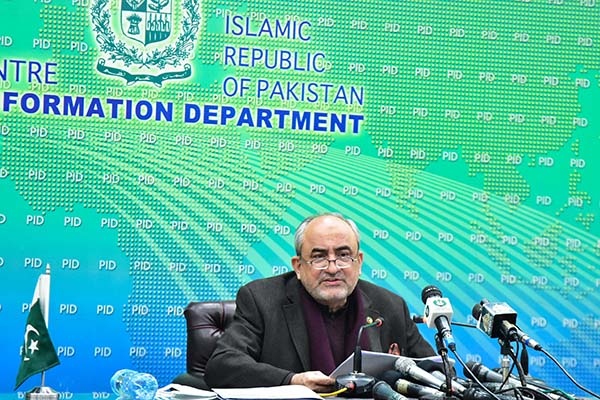
Photo courtesy PID
Khalid Mansoor says Chinese leadership has said it will consider Islamabad’s requests for debt rollover, additional financial support
Special Assistant to the P.M. on the China-Pakistan Economic Corridor (CPEC) Khalid Mansoor on Monday claimed that the interest expressed by Chinese companies to investing in Pakistan suggests that Phase II of the project can attract billions of dollars to the country.
Addressing a press conference after returning to Islamabad from Beijing, where he was part of a delegation that attended the opening ceremony of the Winter Olympic Games, he said that Prime Minister Imran Khan had personally participate in 20 meetings with representatives of nearly 500 companies. He said the premier had assured the potential investors of his government’s full cooperation, adding that the “pitch book” presented to the companies had provided detailed information on investment opportunities in sectors such as textiles, pharmaceuticals, footwear, information technology, and agriculture.
Noting that 65% of Pakistan’s population was under 40, he said the companies had been informed that investing in Pakistan would provide them skilled labor force that was “cheaper” than China. As part of the government’s efforts to facilitate Chinese investors, he said, they had been exempted from requiring No-objection Certificates from 37 different departments if they wished to invest in special economic zones. It would now be the responsibility of Chinese investors to comply with Pakistan’s laws, he said, claiming this was per their desires. Such investments, he stressed, would be subject to audit and violations of the law would entail penalties and other fallouts.
Similarly, he said, the CPEC Authority would provide a one-window facility to investors, adding that the premier had assured them that his office would personally resolve any lingering issues. He said Pakistan had pledged to complete prior actions like payments of dues to power producers and the establishment of a revolving fund for future interest payments to encourage further investments. “Before going to China, we made Rs. 50 billion payment to nine Chinese IPPs [independent power producers], including coal-based projects like Engro and Port Qasim. Finance Minister Shaukat Tarin has also assured that another Rs. 50 billion would be cleared before the end of the current month,” he said.
The Chinese “acknowledged this progress and are very happy,” Mansoor claimed, adding that were all essential confidence building steps to encourage further investments in Phase II.
Investments
According to the SAPM, Chinese companies would support in setting up a Steel and Metal Recycling Plant in Gwadar within three years, claiming this would produce metals worth $4.5 billion for exports and create 40,000 jobs. He said Chinese companies would also help develop Pakistan’s agriculture on modern lines to enhance per acre yield and seed quality.
He said a Chinese company was interested in constructing LNG storage at the Karachi port, and another wanted to set up a factory on Lahore-Kasur Road for value-added products in the textile sector.
Mansoor claimed Chinese company Royal Guru was interested in investing $50 million in the automobile sector of Pakistan, adding that Chinese companies also wanted to invest $200 million in making medical devices and $2 billion to lay optical fiber.
He said Phase I of CPEC had envisaged $53 billion investments, of which $25 billion had already materialized while $28 billion were under consideration.
Regarding the main railway line from Karachi to Peshawar (ML-1), he said the Chinese side had already provided an estimated financial cost, while Pakistan had completed a feasibility study. He said it had been decided to proceed toward competitive bidding because of a price difference between the two.
To a question about Pakistan’s request for $4 billion debt rollover, extension in currency swap from $4.5 billion to $10 billion and additional financial support of $5.5 billion, the SAPM said the Chinese leadership had promised to consider these requests and communicate their decision later. He said both Pakistan and China would remain engaged at the foreign ministers’ level to review the progress on the meetings that took place during the prime minister’s visit.
